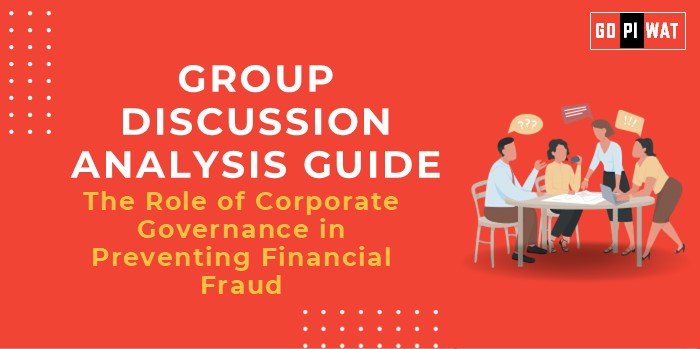📋 Group Discussion Analysis Guide
🌐 Topic: The Role of Corporate Governance in Preventing Financial Fraud
💡 Introduction to Corporate Governance and Financial Fraud
Opening Context: “Corporate governance serves as the backbone of ethical and transparent business operations, aiming to protect stakeholders’ interests and prevent financial malpractices. With financial fraud incidents like the Enron scandal and India’s Satyam case shaking investor confidence, robust governance has become indispensable.”
Topic Background: Corporate governance refers to the system of rules, practices, and processes through which companies are directed and controlled. Over the past two decades, a series of high-profile corporate frauds have highlighted its critical role in financial integrity. Regulations like SEBI’s LODR in India and Sarbanes-Oxley Act in the U.S. have sought to reinforce governance frameworks to prevent malpractices.
📊 Quick Facts and Key Statistics
- 💰 Global Cost of Fraud: $5.38 trillion annually (ACFE Report, 2023).
- 🇮🇳 India’s Corporate Fraud Impact: ₹60,000 crore+ loss in 2022 due to financial frauds (Deloitte).
- 📉 Satyam Scandal: ₹7,136 crore falsification, exposed governance lapses.
- 📜 Regulations: SEBI mandates independent directors to comprise at least 50% of boards for listed firms.
- 🔍 Fraud Detection Mechanisms: Whistleblowing reports help detect 43% of frauds globally (ACFE).
👥 Stakeholders and Their Roles
- Corporate Boards: Formulate and monitor policies to ensure accountability.
- Auditors: Provide unbiased financial evaluations and risk reporting.
- Regulators (SEBI, RBI): Enforce governance norms and penalize non-compliance.
- Shareholders: Demand transparency and effective oversight.
- Whistleblowers: Report unethical practices, strengthening early fraud detection.
✅ Achievements and Challenges
Achievements:
- 📜 Enhanced Regulatory Framework: Adoption of stringent norms like SEBI’s Clause 49 and SOX Act.
- 📈 Increased Accountability: Independent directors and external audits improve oversight.
- 💻 Digital Forensics: Use of technology to detect anomalies in financial statements.
- 🔎 Transparency Mechanisms: Mandatory disclosures improve investor trust.
Challenges:
- 📌 Board Independence: Independent directors often lack real autonomy or expertise.
- ⚠️ Weak Whistleblower Protection: Insufficient safeguards discourage internal reporting.
- 📉 Regulatory Loopholes: Fraudsters exploit gaps in oversight and enforcement.
🌍 Global Comparisons
- 🇺🇸 Enron (USA): Led to the SOX Act, improving audit transparency.
- 🇩🇪 Wirecard (Germany): Revealed flaws in auditor independence.
Case Study: Satyam Computers – Highlighted lapses in auditor independence and board accountability. The scam led to stronger reforms like mandatory rotation of auditors and whistleblower policies.
📚 Structured Arguments for Discussion
- Supporting Stance: “Effective corporate governance, through board independence and regulatory oversight, significantly reduces financial fraud.”
- Opposing Stance: “Despite governance frameworks, high-profile frauds like IL&FS and Yes Bank reveal persistent loopholes and non-compliance.”
- Balanced Perspective: “While governance policies are critical, their success hinges on effective enforcement, ethical leadership, and investor vigilance.”
💬 Effective Discussion Approaches
- Opening Approaches:
- 📊 Statistical Approach: “With financial fraud costing the global economy over $5 trillion annually, the role of corporate governance cannot be overstated.”
- 📜 Case Study: “The Satyam scandal exposed systemic lapses, forcing India to rethink its governance framework.”
- Counter-Argument Handling:
- Acknowledge flaws in governance systems.
- Propose solutions such as stricter penalties, improved whistleblower protection, and technology-driven monitoring.
🧐 Strategic Analysis of Strengths and Weaknesses
- Strengths: Enhanced regulations, whistleblower policies, and audit reforms.
- Weaknesses: Lack of autonomy, whistleblower vulnerability, regulatory delays.
- Opportunities: AI-driven financial forensics, global benchmarks adoption.
- Threats: Cyber frauds, evolving financial crime methods.
📖 Connecting with B-School Applications
- Real-World Applications: Integrating governance principles in case studies, financial risk management, and leadership ethics.
- Sample Interview Questions:
- “What role do independent directors play in improving corporate governance?”
- “Discuss the impact of technology in detecting financial fraud.”
- Insights for B-School Students:
- Research governance failures (e.g., IL&FS, Yes Bank).
- Explore AI tools for fraud prevention.


